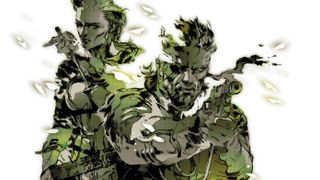Kurt Russell gives thoughtful and nuanced answer about why he wouldn't voice Snake in Metal Gear Solid 3, also seems to think the character is actually Snake Plissken
"I'm a movie guy."

Since the series' earliest days on the humble MSX, one of the big inspirations behind Metal Gear has been John Carpenter's Escape from New York. Protagonist Solid Snake gets his callsign from Kurt Russell's character Snake Plissken (a link that would later be solidified when Snake uses the codename Plisken in MGS2), as well as his general bearing and attitude and equipment, while later games will make the Snake connection even more obvious with the addition of a Plissken-style eyepatch.
So Metal Gear creator Hideo Kojima is obviously a fan. From Metal Gear Solid onwards Snake would be voiced by David Hayter (until Kiefer Sutherland was cast in MGS: GZ and MGSV: TPP) but that seems to have been a somewhat fraught relationship, with the actor revealing that even before that switch Kojima had been looking to re-cast the role, and tried to go back to where it all began.
"I had to re-audition for Metal Gear 3 to play Naked Snake," said Hayter in 2016. "They made me re-audition to play Old Snake, and the whole time, they were trying to find somebody else to do it. I heard that Kojima asked one of the producers on Metal Gear 3 to ask Kurt Russell if he would take over for that game. He didn’t want to do it."
Hayter would go on to voice Naked Snake in MGS3 and take his final bow as Solid Snake in MGS4. But the notion that Russell could've voiced a character based so heavily on one of his own characters has always been a piece of catnip trivia for some fans, and in a new interview with GQ the actor was asked about being approached to star in the series. Warning: the question is direct, but his answer is thoughtful, nuanced, and possibly slightly confused about how close the characters are.
"Look, I’m pretty lazy by nature," says Russell. "There have been many different times when people wanted [me] to do something. I don’t know, I’m a movie guy. You have to understand, that from my point of view, whether it’s Elvis, or Snake Plissken, or Jack Burton, or R.J. MacReady, that was that project. That was that thing. You get into that mindset. You create that. You wanna make that world happen.
"I used to do interviews when Elvis was coming out and they would say, 'C’mon, do a little Elvis for us.' I'd be like… it doesn’t work that way, you don’t just slide in-and-out of Elvis. You go to work on it. You refine it, and then you do it and you get paid for that. I come from a different era. I wasn’t interested in expanding financially off of something that we had created or that I had created in terms of a character."
Finally, Russell leans into being a little critical about the nature of such derivative characters. I should point out that the Snake characters are all extremely different from Snake Plissken in their nature and arcs, but from a purely visual standpoint they can look overly "inspired by" that character: and I'm taking a wild guess that Russell hasn't played Metal Gear. So it may be that Russell just didn't like the vibes of something that was so close on a surface-level to what had gone before, and he does seem to think Snake Plissken and the Snakes are more 1:1 than the reality.
The biggest gaming news, reviews and hardware deals
Keep up to date with the most important stories and the best deals, as picked by the PC Gamer team.
"And we'd get business people, sure, saying 'we could do this with that' and I’d look at it and say, 'That’s not written by John [Carpenter],'" says Russell. "That doesn’t smell right. John’s not here to do this. I’m not gonna do that. Let’s go do something new, let’s do something fresh, let’s go create another iconic character, rather than saying 'What can we bleed off this iconic character?'"
It should be pointed out that Russell did reprise his role as Snake Plissken in Escape from LA: but that's a John Carpenter film, and it's also a total banger. Russell ends with some humorously rueful reflection at describing any of his own characters as "iconic."
"You don't look at them as iconic characters," says Russell. "[Fans] refer to them as that, if they become that… you're on [the set] day-to-day running it, having a good time and trying to make it work!"
Rich is a games journalist with 15 years' experience, beginning his career on Edge magazine before working for a wide range of outlets, including Ars Technica, Eurogamer, GamesRadar+, Gamespot, the Guardian, IGN, the New Statesman, Polygon, and Vice. He was the editor of Kotaku UK, the UK arm of Kotaku, for three years before joining PC Gamer. He is the author of a Brief History of Video Games, a full history of the medium, which the Midwest Book Review described as "[a] must-read for serious minded game historians and curious video game connoisseurs alike."
Most Popular







